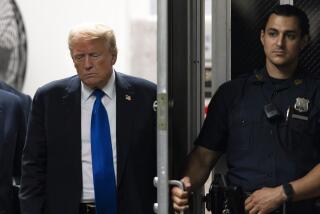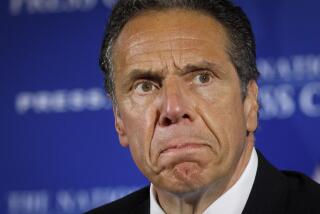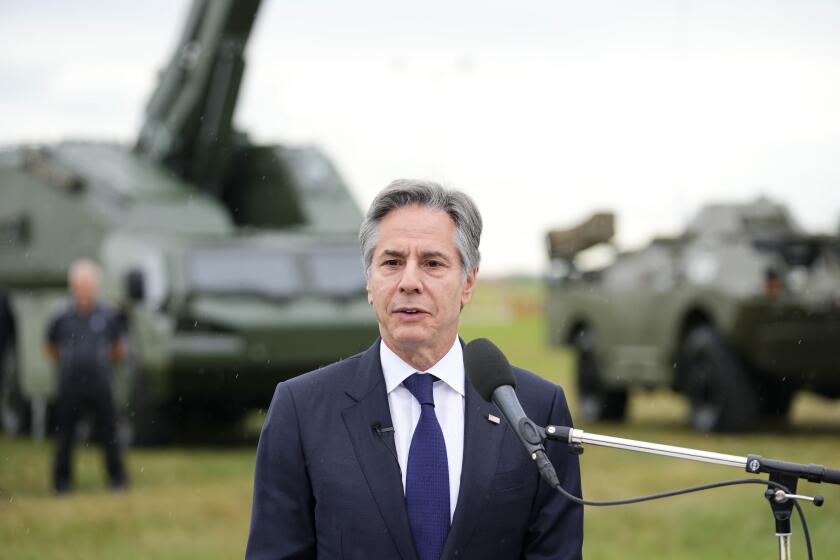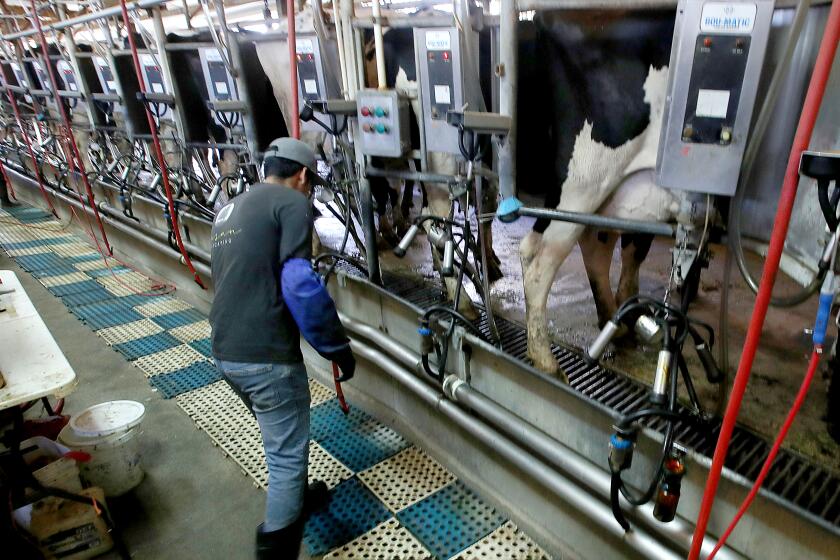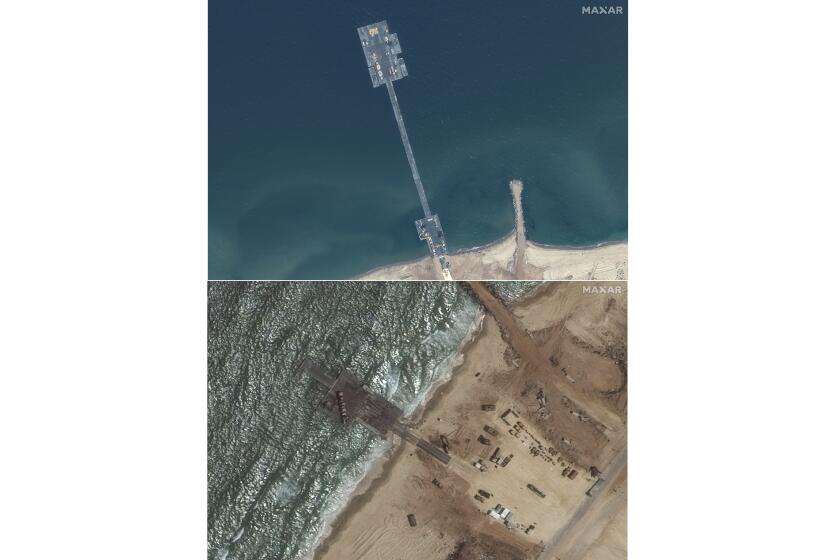Iran’s Runner-Up Puts Fundamentalists in Race
From his childhood as the impoverished son of a blacksmith, to his youth as a student activist against the shah of Iran, to his manhood as a soldier fighting in Iraq, Mahmoud Ahmadinejad has had a fierce attachment to Islam and to the teachings of the late Ayatollah Ruhollah Khomeini.
Now the 48-year-old appointed mayor of Tehran appears to have the backing of much of the military, fundamentalists and loyalists of the country’s supreme leader in a runoff election Friday with former President Hashemi Rafsanjani. If Ahmadinejad wins, it would be seen as a victory for the most fundamentalist wing of Iranian politics and a devastating setback for reformers.
Machinations continued between the two sides Monday, but the closure of at least two reform newspapers that had planned to publish a complaint questioning the legitimacy of Friday’s first round of voting seemed to signal a tactical defeat for Ahmadinejad’s opponents.
Other evidence that the Islamic Revolution’s most ardent devotees were prevailing came when the Guardian Council, after a cursory recount of a sampling of ballot boxes in four cities, ratified last week’s vote. The council, an unelected constitutional watchdog body, ordered the runoff to go forward, in effect shrugging off the reformists’ protests.
Also, the nation’s supreme leader, Ayatollah Ali Khamenei, angrily rebuked the cleric who placed third in the poll for daring to allege publicly that the election result had been manipulated.
“Are you aware that what you are doing is aimed at creating a crisis and pessimism among people and it is in line with what our enemies want to do to the revolution and to the Islamic Republic?” Khamenei wrote, according to the text of a message released by Mehdi Karroubi, the cleric who made the complaint.
“It will catch up with you too,” Khamenei warned the onetime parliament speaker who has joined the reformist camp. “I was not expecting this from you.”
To protest the authorities’ dismissal of his complaint, Karroubi quit the Expediency Council, the senior body that resolves conflicts among government branches.
Although Rafsanjani might still appear to be the favorite in the election because of his experience, there is a sense that momentum is surging for newcomer Ahmadinejad after his surprise showing in the first round. Among a field of seven candidates, Rafsanjani finished first with 21%, or about 6.2 million votes. Ahmadinejad had 19.5%, or 5.7 million.
Ahmadinejad is presenting himself as the champion of Islam and defender of the poor and downtrodden. He has militant supporters who believe that he is the man who will revive the flagging spirit of the 1979 revolution, which overthrew the shah and triggered the takeover of the U.S. Embassy in Tehran, where 52 Americans were held hostage for 444 days.
The Islamic state has had no diplomatic ties with the U.S. since the hostage crisis. Tensions have heightened in the last year as Washington sought to pressure Iran to end its nuclear program.
A victory for Ahmadinejad could scuttle hopes that Tehran would reach out to the West. Rafsanjani recently pledged to work toward reducing tensions and improving relations with Western nations if they respected Iran’s sovereignty.
But Ahmadinejad told members of the conservative parliament Monday that there is no need to compromise with the West on the nuclear program, an obvious swipe at Rafsanjani. “Those who are in negotiations are frightened and don’t know the people,” the mayor was quoted by Reuters as saying. “A popular and fundamentalist government will quickly change the country’s stance in favor of the nation.”
Fearful of manipulation in the second round, Rafsanjani’s supporters say, with a tone of urgency, that their best hope is that reformers who have opposed him in the past will now rally to Rafsanjani as the more moderate candidate and produce enough votes to put the results beyond question.
That is not the hope at Ahmadinejad’s campaign headquarters, located on a side street of a traffic-clogged square in a gritty area of central Tehran. On Monday, bearded young men on motorbikes watched the approaches to the house. Some lolled inside on carpets, their dusty sandals piled up by the doorway on a landing.
The Basijis, members of religious pro-government militias, are considered to be part of Ahmadinejad’s base of support. They are known for enforcing dress codes for women and combating “un-Islamic” behavior such as couples meeting in city parks or walking together at night.
As mayor, according to supporters and his own campaign literature, he accepted a salary no more than the amount he received in his previous job as a university professor. He insisted that his attire be indistinguishable from a street sweeper’s, a contrast with the wealthy Rafsanjani, who often wears regal robes.
Ahmadinejad’s workday, according to his campaign, starts at 6 a.m. and ends at midnight.
The mayor is a generation younger than Rafsanjani, 70, who served two terms as president from 1989 to 1997, and before that, as speaker of parliament.
To his opponents, Ahmadinejad is the stalking-horse for the faction of the Iranian leadership that supports the activities of groups abroad such as the Lebanese-based Hezbollah, opposes increased engagement with the West and wants to continue with the development of the country’s nuclear program, which European and U.S. experts say is aimed at acquiring weapons.
Opponents see Ahmadinejad as being Khamenei’s choice. “If he wins, Khamenei will really rule everything,” Mohammad Reza Khatami, head of Iran’s largest reform party, told Reuters.
“We will not have free elections, and opposition voices won’t be tolerated.”
Human rights activists have also warned that Ahmadinejad would impose stricter social rules. Women would have to revert to more conservative dress, the unofficial tolerance of satellite dishes and discreet consumption of alcohol would be abandoned, and the media would become more muzzled.
Emad Baghi, a former political prisoner, said that when Ahmadinejad was asked by one reporter about political prisoners, he replied, “Who do you mean -- those held in the United States?” In other words, Baghi said, Ahmadinejad does not acknowledge that Iran has any such prisoners.
Aides wouldn’t let a reporter inside the campaign headquarters Monday. Near the headquarters, several supporters of Ahmadinejad said they admired the man who until recently was not well known in most of Iran.
“Everyone else was surprised, but we were not surprised at the results of Friday’s election. We expected it,” said Ibrahim Manyvand, 28, a physics student. “The Iranian people pay tribute to the revolution, and find that the values of the revolution are important to them.”
Manyvand described Ahmadinejad as extremely humble and at first reluctant to run for president. Another supporter, Mahad Saheb, 35, said Ahmadinejad was not a “hard-liner.”
“He has great popularity. This is a sign that he is not a hard-liner,” Saheb said.
Ahmadinejad, who taught at the city’s technical university for several years, was appointed Tehran mayor two years ago after the election of a conservative-dominated City Council. Before that he had been a mayor and a provincial governor general in the northwest of the country, near Turkey.
A pamphlet given out by his campaign traced his life since his boyhood in Narmak, west of Tehran. While he was an adolescent, it said, he sneaked into an advanced Koran class at the local mosque but was ejected by the teacher and told to go to the beginner’s course.
Undeterred, he climbed back in through a window. When caught again he was questioned by the teacher, who found out that he already had enough knowledge of the Koran to be allowed to stay, it said.
Two years before the revolution, Ahmadinejad was admitted to the technical university in Tehran and organized an Islamic student group, inspired by the then-banned teachings of Khomeini and another cleric. At the time, the pamphlet said, most of the 200 students interested in politics were Marxists, but Ahmadinejad rejected them and insisted on Islamic resistance, soon drawing more than 50 adherents to his group.
Before the shah was forced to leave the country, Ahmadinejad was arrested and imprisoned several times by the secret police, the SAVAK. Ahmadinejad said that his experience climbing the mountains around Tehran had made him physically tough, and so better able to resist the torture he experienced.
In university, he had organized a strike and spray-painted Islamic slogans on walls. After the shah was overthrown, according to the account, he helped organize Islamic political societies at universities, and in that capacity was among a group of student leaders allowed to meet with Khomeini.
When war with Iraq broke out in 1980, it said, he volunteered for the Revolutionary Guards, and served in special operations at the front line in and around the Iraqi city of Kirkuk. Later, he was put in charge of military engineering.
The pamphlet quoted him as saying of himself: “I am very proud that I am a teacher. I am very proud to be a military man, and I pray to God to keep me exactly as I am.”
More to Read
More to Read
More to Read
Start your day right
Sign up for Essential California for news, features and recommendations from the L.A. Times and beyond in your inbox six days a week.
You may occasionally receive promotional content from the Los Angeles Times.
